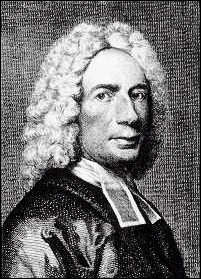#82
Before Jehovah's Awful Throne
Words by Isaac Watts,
1719 (1674-1748)
Music by John Hatton (1710-1793)
Before Jehovah's awful throne,
Ye nations, bow with sacred joy;
Know that the Lord is God alone;
He can create, and He destroy.
His sovereign power, without our aid,
Made us of clay, and formed us men;
and when like wandering sheep we strayed,
He brought us to His fold again.
We'll crowd His gates with thankful songs,
High as the heavens our voices raise;
And earth, with her ten thousand tongues,
Shall fill His courts with sounding praise.
Wide as the world is His command,
Vast as Eternity His love;
Firm as a rock His truth shall stand,
When rolling years shall cease to move.
 Isaac
Watts was born on July 17, 1674, in Southampton, England. Isaac eventually learned
Greek, Latin, and Hebrew under Mr. Pinhorn, Rector of All Saints, and headmaster
of the Grammar School in Southampton. Isaac’s taste for verse showed itself
in early childhood, and his promise caused a local doctor and other friends
to offer him a university education, assuming he would be ordained in the Church
of England. However, Isaac declined and instead entered a Nonconformist Academy
at Stoke Newington in 1690, under the care of Thomas Rowe, pastor of the Independent
congregation at Girdlers’ Hall; Isaac joined this congregation in 1693.
Isaac
Watts was born on July 17, 1674, in Southampton, England. Isaac eventually learned
Greek, Latin, and Hebrew under Mr. Pinhorn, Rector of All Saints, and headmaster
of the Grammar School in Southampton. Isaac’s taste for verse showed itself
in early childhood, and his promise caused a local doctor and other friends
to offer him a university education, assuming he would be ordained in the Church
of England. However, Isaac declined and instead entered a Nonconformist Academy
at Stoke Newington in 1690, under the care of Thomas Rowe, pastor of the Independent
congregation at Girdlers’ Hall; Isaac joined this congregation in 1693.
Watts left the Academy at age 20 and spent two years
at home; it was during this period that he wrote the bulk of his Hymns and Spiritual
Songs, over 500 in his lifetime.
Watts preached his first sermon at age 24. In the next
three years, he preached frequently, and in 1702 was ordained as pastor of the
Independent congregation in Mark Lane. At that time he moved into the house
of a Mr. Hollis in the Minories. His health began to fail the next year, and
Samuel Price was appointed as his assistant in the ministry. In 1712, a fever
shattered his constitution, and Price became co-pastor of the congregation,
which had moved to a new chapel in Bury Street. It was at this time that Isaac
became the guest of Sir Thomas Abney. He lived with Abney (and later Abney’s
widow) the rest of his life, mainly at Theobalds in Hertfordshire, then for
13 years at Stoke Newington.
In 1728, the University of Edinburgh awarded Watts a
Doctor of Divinity degree. Isaac Watts died on November 25, 1748, at Stoke Newington,
England.
 Isaac
Watts was born on July 17, 1674, in Southampton, England. Isaac eventually learned
Greek, Latin, and Hebrew under Mr. Pinhorn, Rector of All Saints, and headmaster
of the Grammar School in Southampton. Isaac’s taste for verse showed itself
in early childhood, and his promise caused a local doctor and other friends
to offer him a university education, assuming he would be ordained in the Church
of England. However, Isaac declined and instead entered a Nonconformist Academy
at Stoke Newington in 1690, under the care of Thomas Rowe, pastor of the Independent
congregation at Girdlers’ Hall; Isaac joined this congregation in 1693.
Isaac
Watts was born on July 17, 1674, in Southampton, England. Isaac eventually learned
Greek, Latin, and Hebrew under Mr. Pinhorn, Rector of All Saints, and headmaster
of the Grammar School in Southampton. Isaac’s taste for verse showed itself
in early childhood, and his promise caused a local doctor and other friends
to offer him a university education, assuming he would be ordained in the Church
of England. However, Isaac declined and instead entered a Nonconformist Academy
at Stoke Newington in 1690, under the care of Thomas Rowe, pastor of the Independent
congregation at Girdlers’ Hall; Isaac joined this congregation in 1693.